Jethro Tull
Albums reviewed on this page: This Was,
Stand Up, Benefit,
Aqualung,
Thick as a Brick, Living in the
Past.
Perhaps the best things about Jethro Tull are that their
records
are always about and fairly cheap. Tull has good
musicianship,
good influences and Ian Anderson. Anderson irks me; his
vocals
are inconsistent, his songwriting repetitive, and his lyrics became
increasingly dense. Tull started out as one of those
blues/jazz
groups in the late 60s, fairly unique by having a flautist, and then
moved on towards an interesting metal/folk combination. Here
the secret (not really) is that Anderson draws upon English folk in
traditional forms, rather than the popular
American version, without being as strict as groups like
Fairport
Convention or the Pentangle. Anderson himself seems to be a
somewhat problematic figure - as in he writes almost all their music,
but frequently did not bother to come up with terribly memorable
melodies, instead coasting on the group's sound. Yes, some of
their albums are hailed as landmarks, but I am much more
doubtful.
They do seem to grow on one, however, so I have reserved any outright
condemnation for later (at least in this intro).
Personnel: Glenn Cornick (bass), Clive
Bunker (drums), Mick
Abrahams (guitar), Ian Anderson (flute,
vocals,
acoustic guitar, occaisonal keyboards, anything that involves
blowing). Abrahams got out after This
Was, and his interim
replacements were Tony Iommi
and Davy
O'List. Iommi appears with them on The
Rolling Stones'
Rock and Roll Circus. Martin Barre became
a
permanent member in Abrahams' stead. John
Evan
(piano, etc) joins on starting with Benefit.
Cornick
quit in 1971, replaced by Jeffrey Hammond-Hammond,
who
first appears on Aqualung. Bunker left
soon after,
replaced by Barriemore Barlow.
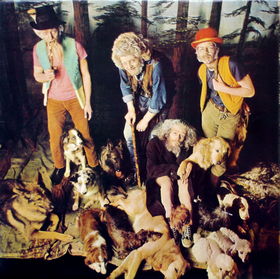 This
Was (1968), **1/2
This
Was (1968), **1/2
In 1968 all
you needed to do was whistle in a 12-bar format in order sell
records. This
Was is frustrating because you can tell
that the group had huge potential, yet did not have it together yet,
and relied on blues a bit too much. Breaking it down -
Anderson's lyrics are not special, and his flute playing doesn't seem
to be that interesting (I always cringe during his grunting solos),
even if it was novel. Abrahams was a good blues guitarist,
but
certainly second-tier. He also manages to contribute one of
the
two interesting songs - "Move On Alone" which manages to
move beyond the blues and has a neat guitar tone. Clive
Bunker
is sort of a hard-hitting jazz-style drummer, but achieves overkill
during his soloing in "Dharma for One" (I guess he was the
One). The other interesting song is "It's Breaking Me Up"
which is traditional blues that works. "Song for Jeffrey"
is also here, but it kind of gets lost amidst the same-sounding
tracks and I cannot understand most of what Anderson's
singing.
Nice slide bits in there still. This Was is
somewhat
likeable, but still essentially faceless. Produced by Terry
Ellis and the group.
Blodwyn
Pig: Ahead Rings Out (1969)
Mick
Abrahams new group. I have this and think it is okay.
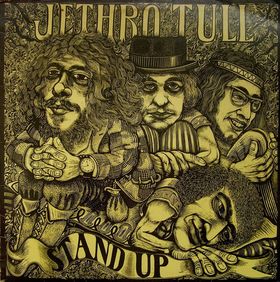 Stand Up
(1970), ***1/2
Stand Up
(1970), ***1/2
Tull
expanded
in all sorts of directions with Stand
Up.
With Abrahams
gone, his job was split up into two main parts. The lead
guitar
goes to Barre, which allows Tull to move from their rote blues
towards something approaching early metal (the opener "A New Day
Yesterday" being the best), even if they already are getting
lost in their own riffs ("For a Thousand Mothers").
Meanwhile Anderson contributes some Elizabethan folk ("Jeffrey
Goes to Leicester Square", and "Fat Man" whose lyrics
sound tossed off), while really shining on more normal folk songs
("Look Into the Sun", the orchestrated "Reasons for
Waiting" whose flute duet [with Barre no less] is the prettiest
moment on the record). Yes, he also appears to have dropped
the
grunting during his solos. Not everything has changed, as
"Nothing is Easy" could easily be the best track on This
Was, despite/because of its traded solos and overlong
ending,
and
a delightful jazzy arrangement of Bach's "Bouree" has some
strong flute soloing). However, the best song is arguably a
well formed combination of both these styles (cross-pollination
occurs throughout the album)- "We Used To Know" with
Anderson relatively simple acoustic melody overlaid with Barre's
wah-wah soloing. To put it bluntly, this a quality record as
even the songs I do not particularly care for have good qualities to
them (the intro to "Back to the Family" for instance).
Produced by Ellis and Anderson. Yeah, I am kind of
disappointed
that the Bach song is credited only to Anderson, but Led Zeppelin did
far worse.
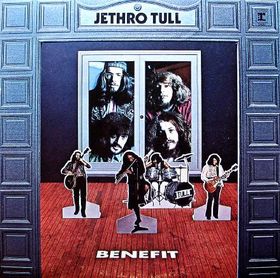 Benefit
(1970), ***
Benefit
(1970), ***
Not
really
anything new, except that Tull's songs became more riffy and
the rhythm section began to atrophy. Anderson is still
up to his traditional folk thing ("for Michael Collins, Jeffrey
and me", and "Inside") but none of those songs really
go beyond the role of album filler. Anderson's irritating
vocal
tendencies are starting to show up on these tracks as well (the
blatantly classical "Sossity; you're a woman").
However, Anderson does produce about half an album full of good
material, most of which is dependent of Barre and his role as Prince
of the Snappy Guitar Lines. These songs range from rock/folk
hybrid ("With You There to Help Me" and its solo trading,
or "A Time for Everything?") to a pair of fascinating
harder songs with harmonized bass and guitar lines ("Nothing to
Say", the riffy "To Cry You a Song" which is one the
group's high points). However, one of my favorite Tull songs
has to take the crown on this one - the fun well-balanced "Teacher",
which effectively mixes the various styles that swirl around on their
albums. Otherwise, some strange half experimental stuff
comprise the rest, such as "Son", effectively an obnoxious
parent speech with an unexpected Beatles-like acoustic interior. The
other example is "Play In Time" where John Evan's hard
organ sound makes them sound like Deep Purple, and psychedelic sound
effects crop up, making the track sound three years old. All
in
all, Benefit
is a pretty solid album with Barre
doing such a
good job he almost carries some songs. Evan was not
officially
a member yet, but he had played with Anderson earlier.
Purists
please note that I took the liberty of capitalizing the song
titles.
Forgive me. Produced by Anderson.
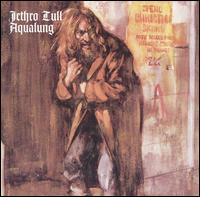 Aqualung
(1971), ***
Aqualung
(1971), ***
Tull
was an
odd collection of bits. Their two main players were Ian
Anderson, a flautist who plays classical guitar, and Martin Barre, an
electric guitarist who has metal potential. This results in
an
interesting balance between hard rock and folk/classical leanings,
often in the same song. On this odd concept album the
demarcation is clear. On the first side, the title track and
"Cross Eyed Mary" use both of Tull's interests in the same
song and were hits (the second side's "Locomotive Breath"
likewise.) The rest of side one is made up of songs based
around Anderson's classical guitar, including the likable "Mother
Goose" with Elizabethan recorders. The second side is a
mess, with Anderson the songwriter going out of control. His
reliance on riffs, which served him well on the aforementioned songs,
gets boring on his pro-God anti-Church sermon that makes up the
latter half of the album (except for "Locomotive Breath"
with its wonderful piano intro). The side opens with "My
God", which quickly turns into "My God, this is some boring
crap." Worse, his lyrics start to take on a whiny
annoying tone, and he does not seem to take his vocals very seriously
throughout ("Wond'ring Aloud"). Often hailed as a classic,
Aqualung's
parts do not quite match.
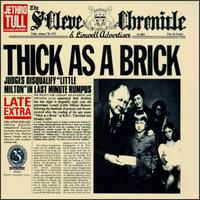 Thick
as a Brick (1972), **
Thick
as a Brick (1972), **
[Ed.
- this
will be re-written and raised at least half a star.] Not as bad as I
was led to believe. Thick as a Brick is
infinitely
better than Tales from Topographic Oceans,
for
example
(although that alone is not quite a compliment). My
comparison with Yes is not apples to oranges, as Tull borrows a lot
from that prog school here. The use of only one track, the
changing time signatures are the structural elements, but musically
there are differences with their previous albums as well. Granted,
the single song is based on one poem, but there are distinct musical
themes, usually tied to stanzas, which beg for interruptions.
As for the lyrics (poem) itself, it is fine, although Anderson's
vocal delivery and the length makes it hard to follow while
listening. I really like the opening part of the album (that
which you hear on radio), and consider it one of their best
works.
In keeping with the times, John Evan demonstrates that he has studied
at the Emerson/Wakeman School for Keyboardists Who Want to Use
Classical Motifs. He eventually becomes overwhelming,
contributing multiple parts at many points, but is limited in the
lines that he plays. All of this is to the detriment of
Barre,
whose role is reducing to a few solos and doubling Evan's rhythm
playing. New drummer Barlow also wants to make an impression,
which he does so by overplaying most of the time, which includes an
annoying drum solo towards the beginning of the second half.
Thick as a Brick has plenty of good moments, but
certain
elements drag the album down.
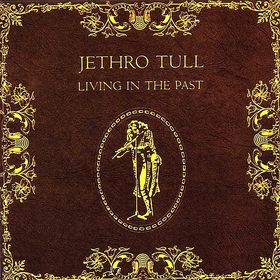 Living in the
Past (1972), **1/2
Living in the
Past (1972), **1/2
Living
in
the Past is one of those odd track collections, gathering
singles
and unreleased songs, with a few album tracks thrown in and 20
minutes of a live concert to pad it out to four full sides.
For
Tull fans this must have been a godsend, and it is interesting to
hear the small amount of musical progression that Tull makes.
But Living in the Past's problems are the same as
any of their
albums' - all the songs blend together in one big blah
eventually.
Yes, I hold Ian Anderson to blame, as his focus seems to be on his
increasingly scatter-shot lyrics and less on melody. Heck, most of
the last side sounds like it was tossed off as intentional
filler.
That isn't to say Living in the Past does not have
good
points; "Teacher" has to be one of my favorite Tull songs,
and the title track and "Life is a long song" are also
nice. The live side, taken from a 1970 NYC concert also works
well because it flies in the face of Anderson's folk formula.
Evan turns out to be a sort of less-cumbersome Keith Emerson (similar
to John
Gosling)
on "By
kind permission of", while Anderson takes a back seat and lets
the band play. "Dharma for one" has much of the same
approach, as the band plays great, the lyrics go on the back burner
and a fun time is had by all, despite the fairly boring drum
solo.
The other place where this happens is Anderson's instrumental
arrangement of Bach's "Bouree", with good playing from
all. Thus, one
good album is in the midst of this (well,
maybe
3/4ths), but you have to wade through a ton of bleh.
A Passion
Play (1973)
How
could I resist buying this? I couldn't and did.
War Child
(1974)
Yes,
I bought this as well.
Of course, they
continue on to the present day...
I
have nothing to
say, so back to the Music Page...
 This
Was (1968), **1/2
This
Was (1968), **1/2
 Stand Up
(1970), ***1/2
Stand Up
(1970), ***1/2
 Benefit
(1970), ***
Benefit
(1970), ***
 Aqualung
(1971), ***
Aqualung
(1971), ***
 Thick
as a Brick (1972), **
Thick
as a Brick (1972), **
 Living in the
Past (1972), **1/2
Living in the
Past (1972), **1/2